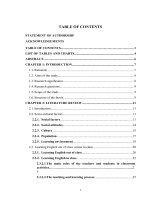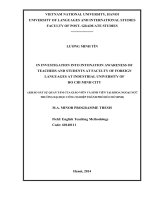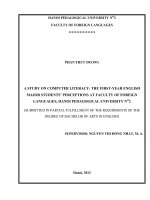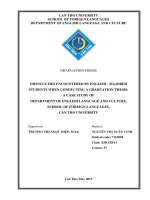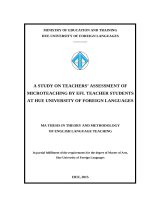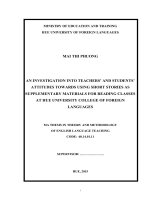HUE UNIVERSITY OF FOREIGN LANGUAGES
Bạn đang xem bản rút gọn của tài liệu. Xem và tải ngay bản đầy đủ của tài liệu tại đây (64.37 KB, 9 trang )
HUE UNIVERSITY OF FOREIGN LANGUAGES
DEPARTMENT OF ENGLISH
--------------
HUCFL 1st STUDENTS AND THE FACT OF
STUDENTS’ AUTONOMY IN CREDIT PROGRAM NOWADAY
RESEARCH METHOD - CLASS 1
NGUYỄN MINH DŨNG
Hue, May 2018
TABLE OF CONTENTS
I.
II.
III.
IV.
INTRODUCTION
METHODOLOGY
REFERENCES
APPENDIX
INTRODUCTION
Credit – Based System is an advanced training method in the world. Converting
from FIXED-CURRICULUM system to ACADEMIC CREDIT system is an
indespensable of education and training system in Vietnam with the trend of
regional and international integration. On August, 15th, 2007, Minister of
Education and Training had made a decision about lauching “Official university
and college training regulations under Credit – Based System”. The essence of
this method is to promote student activeness, in which self – learning is the key
factor in the student’s academic performance under Credit system. Self – study
is an indispensable form of study for students studying at universities.
Organizing self – learning activities in a rational, scientific, quality and effective
is a responsibility not only in learner but also in training of the school.
The Credit system is a relatively new model in Vietnam. It is a big challenge for
unversities in general and HUCFL in particular to overcome, first of all at the
heightend demand of society, inertia of habit while the facilities and learning
aids are limited. Morever, students, especially freshmans who are not familiar
with environment and the way of teaching in university – a environment that
vastly different from high school environment, as a result, accustomation to this
method is so onerous a task. Some students are not aware as well as clearly
define their paths, have no proprerly study method while requiring about active
in learing increase. To acquire comprehensive knowledge majored in university,
student should make a great effort in studying activity, especially take more
time for self –studying and proper learning method.
Self – learning plays a enormous pivortal role, not only in education but also in
real life. In school, the essence of studying is self – study, the student’s result are
proportional to the self – learning ability of the learner. Besides enhance
student’s academic performance, self – learing facilitates the formation and
training of each person’s ability to operate independently and creatively, thereby
creating conditions and opportunities for lifelong learning.
Self – learning is a demand, a must for ability for all people these days, thus, the
most important goal of the school is not to equip learners with knowledge in lieu
of self – learing methods
In reality, HUCFL students’ autonomy activity has still limited, the majority of
student have not spent much time for self – learining, building and practicing
self – learining skills. Therefore, the study of self – learning issues of student of
HUCFL and solutions to promote the effectiveness of students’ self – learning
activitiess contribute to improving the learning outcomes and learning quality is
pressing. That is why we have chosen this topic. Since time and capiblity is
limited, we just focus on three questions:
1. What roles does self – learning play under Credit – Based System ?
2. What is the fact of self – learning these days?
3. What problems do they encounter when planing for autonomy ?
METHODOLOGY
Time: May 2018
Subject of the study:
- 100 HUCFL 1st students.
- We conduct our research on those students because they are the
freshman who are just enroll to university and have many difficulties in
self – leaning under Credit – Based System . Therefore, it’s much
easier for us to approach and otain a better result as well.
Data collection: We made a survey questionnaire on the paper. Students
are asked to do 4 parts:
- Part 1: 6 close questions
- Part 2: Take notes
- Part 3: 7 close questions
- Part 4: 3 open questions
Date analysis:
- Couting and changing data into percentage
- Using tables and charts.
REFERENCES
1. Hannanh, 1999, p.18
2. Zach et al., 2001
3. Baker & Dempsey, 2007
4. What is microcredit, March 2011, Grameen Bank. [Online] Available at:
/>5. Grameen Bank At Glance, 2011. From Grameen Bank [Online] Available
at: />6. Poverty & Inequality Analysis, 2010. From The World Bank, 2011.
[Online] From />7. Economic Planning Unit, 23 April, 2002, Poverty Eradication: Malaysia’s
Experience, Pp: 1-5
8. Redman, P., 2006. Good essạy wrỉting.' a .social sciences guide, 3rd ed.
London: Open University in assoc. with Sage
9. Smith, J., 1975. A source of information. ln: W. Jones, ed. 2000. One
hundred and one Way.s to jflnd information about health. Oxford: Oxford
University Press. Ch.2.
10. Kant, I., 1785. Fundamental principles of the metaphys'ic ofmorals.
Translated by T.K. Abbott., 1988. New York: Prometheus Books.
APPENDIX
HUCFL 1st STUDENTS AND THE FACT OF
SELF – STUDYING IN CREDIT PROGRAM NOWADAY
Part 1: Students’ awareness of autonomy
Question 1: According to you, self – learining nowadays is ?
A. Very important
B. imperative
C. Normal
D. Trivial
Question 2: Training based on Credit system requires two – thirds of the
student’s self – study compare to class time. This amount is…
A. Few
B. Normal
C. Many
Question 3: Besides class time, how much do you spend for self – learning?
A. 1 hour
B. 2 hours
C. 3 hours
D. More than 4 hours
Question 4: Have you done your study plan that you have set out?
A. Yes
B. No
Question 5: What is your study purpose?
A. Make parents happy
B. Study for a good diploma
C. Acquire knowledge
D. Learning for movement
Question 6: Will you atain high mark when you study hard before exam?
A. Yes
B. No
Part 2: Forms of autonomy
order
1
2
3
4
5
6
7
8
9
10
means
meansures
Usually Sometime
Rare
Group work
Study before going to class
Talk to lecture and friends
Study at the library
Take note carefully
Revision
……………………..
……….................
……………………
……………………
Part 3: Drawbacks in study process
Question 1: Do you feel confused when you realized that curriculum in
university is vastly different from high school?
A. Yes
B. No
Question 2: Are you studying in a good environment?
A. Yes
B. No
Question 3: Have you lost focus on self – study?
A. Yes
B. No
C. Only concentrate before test
Question 4: Have movies or social meadia afftected on your study?
A. Yes
B. No
Question 5: Do you see the amount of knowleadge in the class suits to you?
A. Few
B. reasonable
C. Many
Question 6: According to you, have school’s facilities fully satisfied to your
study?
A. Yes
B. No
Question 7: Do you have any difficulty in finding documents?
A. Yes
B. No
Part 4: Opinion
Question 1: What is your difficulties in self – learning?
……………………………………………………………………………………
……………………………………………………………………………………
Question 2: What is important to you to overcome difficulties in self – learning?
……………………………………………………………………………………
……………………………………………………………………………………
Question 3: What methods are you apply for your study?
……………………………………………………………………………………
……………………………………………………………………………………

